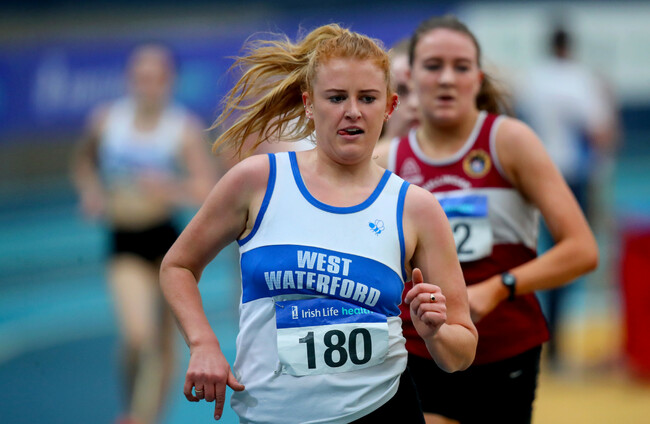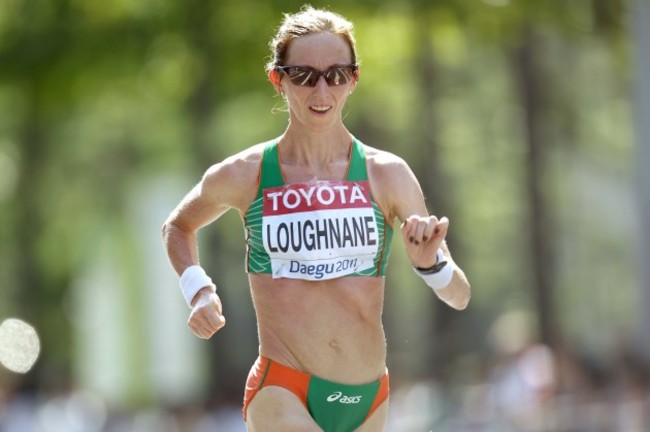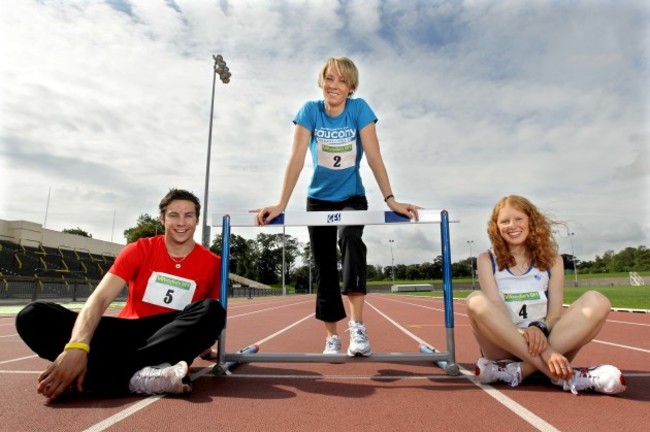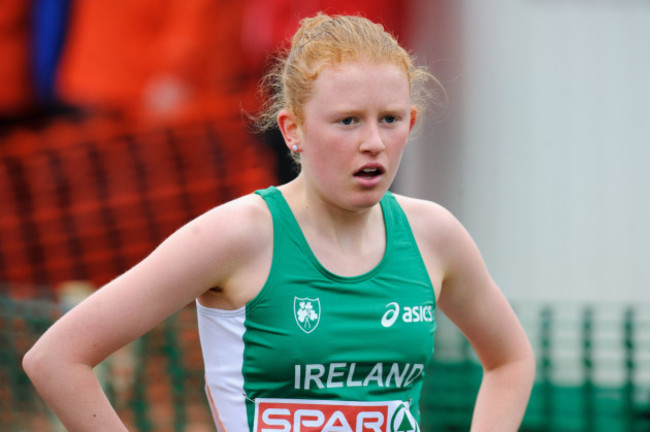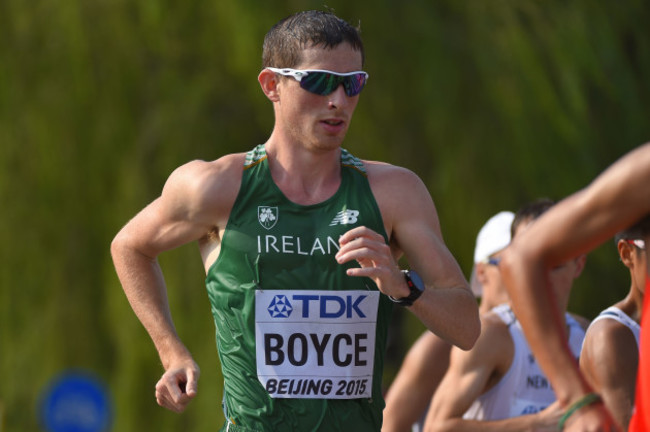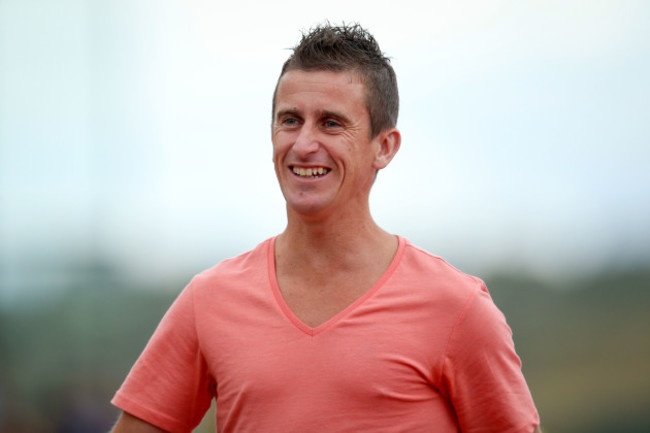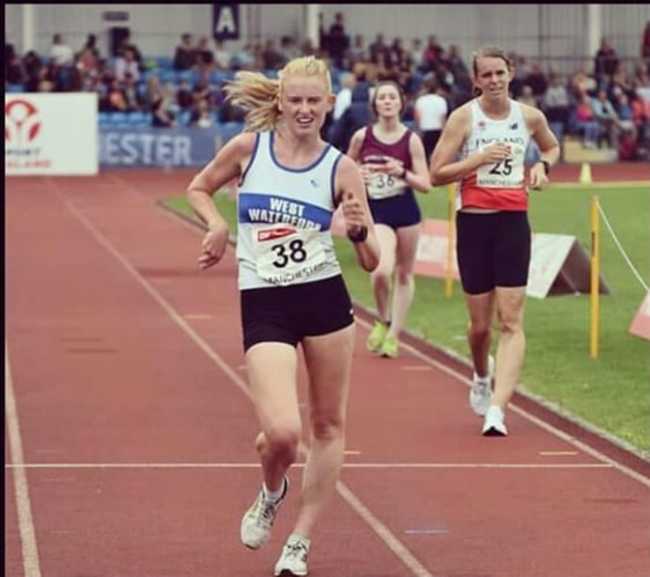AT 25, IT already feels as if Kate Veale’s life could be a movie script, albeit one still awaiting the classic Hollywood ending.
The Waterford native was an immensely gifted athlete who at one stage appeared to have a genuine chance of winning an Olympic medal. And then, all of a sudden, she disappeared, going completely off the radar. So what happened?
To understand her story, it is necessary to go back to her life growing up. An only child, her parents were a big influence. Both were involved in athletics to an extent, particularly her father, who ran regularly, competing in marathons, with a Personal Best in the 2.40s.
“He always had this passion,” Veale explains. “He never got to international or whatever. It was just out running every day for the enjoyment.
He’d be getting up at 8am on a Sunday morning to go off and do 25-mile runs, it was just normal. Just going to races and all that, it was always around me I suppose. It’s gas having that in the house, it’s not like it was pushed on you, it was just what you wanted to do. You just follow on.”
It soon became apparent that like her father, Veale had a passion for running. She took up cross country in her school, St Augustine’s College, and quickly excelled.
“My first major race was a cross-country race in Paris in 2005 that I won,” she recalls. “It was then that I said ‘I really want to have a proper go at this and get to an Olympics.’”
However, fate would take Veale in a different direction ultimately.
“It was the East Munster’s or something. Someone said: ‘Can you just step in there for the walk for points with the school?’ My main event really was the 1500 on the track. I stepped in for the walk. I got a bit of flair for the technique. I started training. So I was doing both [racewalking and cross country]. At U18, I won the national cross country and I went to the European Junior Cross Country in 2011.
“At the time, I was trying to do both and then I made a decision to go with walking — I had more opportunities and stuff, so I decided then to make a proper go of it.”
Around the time of the 2004 Olympics, Veale was left feeling inspired after Irish racewalking star Rob Heffernan paid a visit to her club. And having crossed paths with an elite athlete, Veale then endeavoured to become one.
“I was a bit of a freak,” she says of her early school days. “I was starting to get serious with running and I was kind of mature for my age. I had this mindset that I was different from the rest of the people in my class. The likes of my parents and coaches would have seen that I was different. I would have done extra training and I would have been very particular about everything.
“Before my time, I was looking up stuff about the science [behind sport]. I suppose some people might have thought I was a bit of a weirdo.”
It was fourth year of secondary school when she felt racewalking started to get really serious. By then, Veale was being coached by Jamie Costin, spending considerable time away from school and even attending a training camp in Spain with the likes of Heffernan and Olive Loughnane.
“Just seeing them, I really wanted to be one of them,” Veale recalls. “I was trying to be one of them, but it was before my time. I was trying to push my body. Back then, I was naive. I was on an upward slope, I was getting PBs all the time, improving all the time. I was doing everything right, I was in my bubble and this was my life, and this was all I wanted.
“Fourth year, I would have gone to Russia, to European Youths and the Youth Olympics. I was getting all the national records, 15 up to junior, same with all the school records. Every time I went out, I was beating my own records. I was improving all the time. In fifth year, I would have won the World Youths really convincingly. It was funny, I finished that race and I wanted in my age to be the best in the world and I just felt so much confidence, because it was quite easy.
“I would have felt I could have taken on anyone at that stage. But people would have said it and I would have believed it — I’d be like ‘I’m going to get an Olympic medal. I’m going to do this. It’s just going to improve, it’s going to get better, I’m so excited.’”
Veale also excelled academically. She can’t remember her exact results, but the talented athlete received mostly As and got close to 600 points in the Leaving Cert.
I was a perfectionist and liked people being like: ‘Oh, Kate’s this and Kate’s that’ — thinking that I could do it all.”
It felt as if Veale’s meteoric rise would never abate, but she was about to come cruelly crashing down to earth.
“That year, things started changing. I got a bit of a hip injury. It was the first time I had anything major. I would have had niggles, but it was the first time I started not improving and not being able to do the training and that was frustrating me.
“When I tried to come back, my coach, who was fantastic, was being so careful with me and I wasn’t even listening to him. I would say ‘I’m after missing training the last few days, so I’m just going to do extra training now.’ It was never getting better, it was a vicious cycle. The more training I was doing, the worse I was getting.
“I went to the Youth World Cup, I finished sixth and it was kind of like: ‘Aw look, that’s just the injury, I’ll get over it and I’ll come back with World Juniors.’
“I had access to Rob and Olive and everyone, but if things weren’t going well, I wouldn’t admit it to anyone. I was faking things: ‘It’s fine, I’ll be able to do it.’ I wouldn’t turn to anyone and was thinking it would always be okay. I did [the World Juniors] race and finished 17th, coming from first the year before, to being lapped and [getting a time] that I would have easily beaten 12 months previously.”
Having started out with physical issues, Veale’s problems primarily became psychological thereafter.
I didn’t want to be anything other than an athlete and when I wasn’t, I felt so [lacking in identity],” she explains. “I was known as the athlete in town. Everyone knew of me around the place. I kind of liked that and I wanted to be that. When I finished 17th, then it was more mentally [I was affected], because I knew I wasn’t improving.
“The training got worse, and I kind of just hated the sport then, because I had a bad attitude to it, it was very black and white. If I can’t win and I can’t be the best, I’m not doing this.
“Mentally, it was just draining, and I suppose I was kind of burnt out. I didn’t have anyone pushing me. Someone said to me, ‘you are burnt out’ and they would have asked about my training or coach or family. It was nothing to do with any of them, it was me.”
Having become disillusioned, Veale stopped competing entirely. She went to Dublin City University to study Sports Science and Health in what was the beginning of a hugely difficult and challenging time in her life. The former starlet could only watch on as many of those she had competed against continued to make waves, competing in the Olympics and other illustrious events.
“I felt like a failure,” she says. “So many people had invested so much effort and I felt like I’d let them down, thinking: ‘I should be that. I could be that.’”
As she struggled to leave her sporting past behind, Veale’s mental health deteriorated.
“That was the hard thing back then — it wasn’t me. People were worried about me, my family, my friends, they knew I was different. I was absolutely broken… At the time, you think you’re the only one going through it.
“I can’t even count how many people and how many different therapies and treatments I’ve been through. One of them eventually has to click I suppose. I’ve been through enough.
“People would think: ‘Oh, that’s it for me.’ It was such a rollercoaster. All the time, two steps forward, two steps back. It was so up and down and I was not giving up, even though there’d be days where you’re thinking: ‘My biology or genetics is just like this now, and I can’t do anything about it. This is just me and I won’t be able to be happy, I suppose.’
The funny thing is people don’t even know and they’d never think it about me. They were always like: ‘How do you do it all? I wouldn’t have the [motivation] the way you have.’ Back then, people knew me as the athlete and the person that trained all the time. They’d see me out in any type of weather and not out drinking, so I was kind of different. I wanted to be that person: ‘I’m tough, I’m strong.’ Holding up this ego or something.
“So when the wheels started to come off, it was a big downward spiral. But you don’t give into it. I thought: ‘I’m mentally strong.’ My mind is my greatest advantage and my greatest disadvantage in a sense. I feel I got to the absolute top and I hit rock bottom.
“It got so bad. I was still lying to people, but they knew. There had to be intervention even though I was like: ‘No, it’s fine.’ It actually got to a stage where I gave into it and I was like: ‘Yeah, I do need this and I do need help.’
“It was going on for so long and I was hiding it and I was so good at hiding it. I put on this brave face — I’m just doing this and pretending to my coach, and my coach even knew.
“It was funny, I never would cry ever. It was such a difficult moment — I remember being out with my coach training. He knew [something was wrong from] the way I was training. I just stopped training and started crying, and he gave me a hug. I was so embarrassed because: ‘I’m tough and I’m able to [deal with adversity].’ It was me that drove me to have this burnout. It was: ‘I can’t be feeling like this. I’m not this person, just get on with it’– that old-school mentality. ‘Stop being weak. Stop being such a sissy.’
It’s actually the first time I’ve said it out properly as well, but if I can help one person [it will be worth it]. My friends at home even, if they see this, they’ll be like: ‘Really?’ Because I would have lied to them. They would have thought I was the strongest of the group or whatever.
“It was so bad that I remember my mam making me go to a counsellor. I went into them and they did an assessment with me. It was: ‘Oh, we’re sending you straight to hospital.’ I was like: ‘What? I thought it wasn’t that bad.’ And that’s how bad it got.
“I lied to people at home telling them I was at college. Because it was like: ‘No one can know I’m in here.’ You’re so ashamed.
“After that, I came out of there and it still wasn’t right. They wanted to admit me again. It’s not a six-week programme and you’re better. It’s something you have to work on all the time.”
Veale’s depression was at its most intense between 2012 and 2014. Having sought professional help, the youngster gradually started to feel better to the extent that she decided to return to training, but fate intervened again.
“I started coming back, doing little bits in the gym and I was out running and stuff. I had only done about 5k and I was getting sick after sessions. ‘What the hell?’ I was like: ‘It must be a fever.’ Then I found out I was pregnant.
“I was thinking: ‘How can I deal with this? I can’t look after myself.’
“I had a baby and people would have thought: ‘Oh, sure she won’t finish college now and she won’t get back into athletics. It was like: ‘No.’”
Rather than ending her sporting ambitions, the birth of Fianna in 2015 ultimately made Veale more determined to succeed.
“It made me accepting and it made me better myself and it made me strong. I thought: ‘I’m actually going to be a better person.’
“It was kind of a moment that made me… People say: ‘You have a kid now, it’s different.’ Yeah, it’s different for me, but does it mean I’m not going to the Olympics?
It’s funny because I see that and I want to show [my daughter] what I can do. Having an unplanned pregnancy — sometimes things are just meant to be in your life. You deal with it and you become a better person and your life is better for it.”
Her early attempts at a return in 2016 were tentative.
“I came back, just doing a bit of running for fun. I thought: ‘Do you know what? I’m going to do a road race. And if I do it in this time, so what?’ I trained with my dad. It was lovely. I did the Dublin Marathon with him. I got that love of sport back.
“I didn’t really commit to any proper training. I was just enjoying it and doing bits and pieces. Last year, I came back and was doing a lot of my own stuff. I didn’t want coaching, because I felt really bad with someone putting work into me again when I’m not at the top. I felt ‘I’m not worthy to be getting a coach. I’m not going to be winning a medal, I’ll do my own coaching.’”
However, Veale got chatting to Irish Olympian Brendan Boyce, who convinced her to appoint a coach. So well over a decade on from that fateful first meeting in the local club in Waterford, Heffernan agreed to link up with the rejuvenated racewalker.
“I just appreciate what he’s doing, because never mind the athletes not getting any money, he’s not getting anything and I know there’s a coach over in China getting nearly a million a year and there are other coaches on proper salaries. For him to put the effort in and not be getting anything back, it’s [admirable]. He has the faith in me and he actually said: ‘No, you can do this and your journey is going to be good and you are going to be great again.’
“I’ve learned so much from him. When we’re not training, then we chill. It’s about recovery.
“Before I’d be switched on all the time and so particular about everything. But I was freaking out about it and thinking it was a disaster.
I would have been very black and white before, things had to be perfect. Now it’s like: ‘There are going to be rough days and awful times.’
“The Olympic qualifications came out last week and I was freaking out and Rob says: ‘Calm down, all you can do is get out, do this session and walk today.’”
And Veale has made encouraging progress since returning, winning gold at the National 20k Championships last December among other impressive feats.
At the moment, she is balancing life as an athlete with primary school teaching.
“I think no matter what field you’re in: work, music or art, you can learn something from everybody. The kids say stuff and you learn from it. The other day, they were asked: ‘What do you want to be when you grow up?’ A load of them were saying soccer players. One of them just said: ‘I just want a simple life, because that’s a happy life.’ It was like: ‘My God.’”
However, Veale will soon put everything else aside and switch to full-time training. Events such as the European Cup and the World University Games are on the horizon, while the start of the Tokyo 2020 Olympics is less than 500 days away. To secure qualification, Veale will need to be ranked among the world’s top 60.
I’m definitely not where I was before and where I want to be,” she says. “I still have a hip issue going on that I had before, so that’s probably my major concern at the moment, getting that right. That’s a big thing for me. When I got pregnant, it made it worse again. It’s just one of those things I have to manage.
“Winning a national title, it’s brilliant, you can never take it for granted. But I want to see the bigger picture. I don’t want to just win a national title. The Olympics are the pinnacle of what we’re all aiming for next year. In the meantime, we have a lot of big races coming up before then.
“Rob was 35 winning World Championships. Olive Loughnane was 31 at her best when she won in Berlin. So I am lucky that I have time on my side.”
The life of an elite athlete is rarely straightforward though. To pursue her dream, Veale needs to make a number of sacrifices and must also rely heavily on the support of others.
“I still live with my parents. Athletics isn’t a sport where you’re going to get a lot of money unless you’re at the very top, and now that I’m climbing to the top, if I wasn’t living at home, I’d be lost. I’m just literally in from training now and my dad was out on the bike with me, so he was doing my gels, my drinks, my timing and keeping the wind off me. I got too hot then, I had to take off my jacket and my headband, so it’s doing so many different things at once. And listening to me cursing when the session gets hard and having to deal with me.
“There are times after training like the other day, I came in, I had a hard session and just took off my gear. I threw everything onto the floor and literally just went to bed. I didn’t have the energy to pick up my gear, so my poor mother had to deal with that as well.”
Fianna, meanwhile, is now four years old and unsurprisingly, is already looking like following in her mother’s footsteps.
I’m not even asking or telling her to do anything, but I come in and she’s like: ‘I want to do my training now.’ So it’s out on the road with her and run a bit and come back. Or she’s copying me doing my stretches and exercises. It’s just [repeating] what they see obviously. It’s gas how it’s happening again [like it did with my dad and me].”
Veale says her mental health remains a work in progress. The West Waterford AC athlete continues to regularly see a sports psychologist. She acknowledges her message of “it’s okay not to feel okay” may sound “cheesy” or cliched, but that should not detract from its importance.
“I’m a deep thinker I suppose and now that I’ve come out the other end, I just want people to know that they can [get better]. I would have thought I’m never going to come out of this stage. Even in terms of a career, I thought I won’t even get a job, I won’t do athletics, I’ll just be this person in hospital for the rest of my life. It’s not that way at all now, it’s really not.
“Rob even, I would have thought he was so hardy and never went through any shit. Now I know he did and everyone has.
“It’s okay to ask for help and it will be normal to go through the hard times. [Success] doesn’t keep going up and up. When you have the adversity and the bad days, it’s about getting over those things and simply expecting them.”
Statistics have shown that Irish people tend to drop out of their chosen sport in their late teens at an alarming rate amid the transition from school to college, and these figures relate particularly to females. For a long time, it seemed as if Veale too would succumb to this unfortunate trend.
“In Ireland, the culture we have, you’re thinking you’re missing out on parties and college life. I would have used drink as a crutch. You feel alright for the night and then you’re back to the way you were feeling again the next day with depression, anxiety and stuff.
“Being fit, powerful, putting your body on the line and being out there, pushing yourself to the limit, there’s no better feeling.
I want to get to the next Olympics and will try as hard as I can, but I’m going to enjoy this journey and take the risk and what happens happens.
“It’s exciting. It’s like there’s joy in misery and pain and suffering. It’s finding what’s worth suffering for. And we all have something — it could be music or art or whatever.
“There’ll be a good few shocked friends [reading this article], but that’s good, because it’s real and it helps people in this fake [social media] world.
“Someone was messing with me recently saying: ‘Wouldn’t you love to just be a simple girl who is happy with their normal life?’ They probably are the happiest and they don’t even think about these things. A lot of the time, it’s people who are striving to be successful [who are at risk of depression]. And in the end, they’re the ones that will suffer, the ones that are putting the pressure on themselves and who have that mindset.
“I wouldn’t be the fittest-looking on the start line, but that soul and heart and passion, when I get that mindset, I’m just so driven and dogged. It’s funny how your mind can be your greatest thing ever, and also your worst thing. So it’s about getting that balance.”
Need help? Support is available:
- Samaritans 116 123 or email jo@samaritans.ie
- Aware 1800 80 48 48 (depression, anxiety)
- Pieta House 1800 247 247 or email mary@pieta.ie (suicide, self-harm)
- Teen-Line Ireland 1800 833 634 (for ages 13 to 19)
- Childline 1800 66 66 66 (for under 18s)
Murray Kinsella and Andy Dunne dissect Ireland’s disappointing Six Nations campaign, and discuss the pros and cons of rugby’s new law proposals in the latest episode of The42 Rugby Weekly:
The42 Rugby Weekly / SoundCloud
Subscribe to our new podcast, The42 Rugby Weekly, here:



